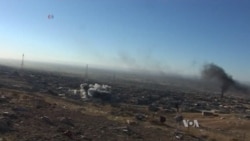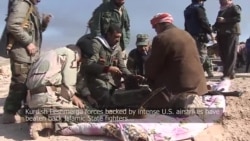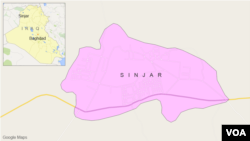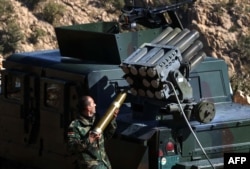Kurdish fighters backed by U.S. airstrikes say they have entered the northern Iraqi town of Sinjar, as they continue a large-scale offensive to retake the strategic city from Islamic State militants.
Peshmerga forces entered the city "from all directions to clear the area of remaining" Islamic State fighters, according to a Twitter post early Friday by the Kurdistan Region Security Council.
The route, known as Highway 47, is used by Islamic State to transport weapons, fighters, illicit oil and other commodities that fund the militant group's operations, according to the U.S. Central Command. It says the U.S.-led coalition intends to increase pressure on Islamic State fighters and isolate their components from each other.
Pentagon spokesman Peter Cook described the operation as a collaborative effort between U.S. advisers and Iraqi Kurdish Peshmerga forces. He said it is a specific effort to target the supply route and, if successful, will have a "significant" impact on IS operations in that part of northern Iraq.
"This is strategically an important area in Iraq in terms of taking the fight to ISIL," Cook said. "We're going to take advantage of every opportunity we have to deliver a blow to ISIL."
Warplanes from the U.S.-led coalition bombed the area Thursday after carrying out daily airstrikes for more than a week. Cook said coalition aircraft have carried out 36 airstrikes in the past 24 hours.
Watch video report from VOA's Jeff Seldin:
But so far, Islamic State is showing no signs of retreat.
"They’re trying to hold [Sinjar],” a U.S. military official told VOA on the condition of anonymity. "They’re fighting to the death. They know how important Sinjar is.”
The Islamic State group seized Sinjar in August 2014 as it terrorized the Yazidi minorities living there and besieged thousands of them in the mountains. It was that offensive that drew the first of more than 5,000 coalition airstrikes in Iraq.
Some 7,500 fighters are taking part in the recapture effort. In addition to retaking Sinjar, they want to establish a buffer zone in the area to protect civilians.
WATCH: Related video report of Sinjar offensive
U.S. and Kurdish officials estimated that there were 500 to 600 Islamic State fighters in and around Sinjar at the start of the Peshmerga operation, including foreign fighters recently sent in as reinforcements.
U.S. officials say 60-70 IS fighters have been killed in airstrikes so far. The Kurdistan Regional Security Council estimated that 100 Islamic State fighters were killed during the first day of the offensive.
That the Islamic State was using just a few hundred fighters to fend off thousands of Peshmerga soldiers came as no surprise to those who have studied the group’s tactics.
"They do not expect to hold Sinjar city and will relinquish it after a tough fight,” said Michael Knights, Lafer Fellow at the Washington Institute for Near East Policy.
Knights pointed to numerous examples over the past year in which Islamic State staged preemptive withdrawals from key cities and towns, especially in Iraq. And he noted that the group had seemed to routinely put more of an emphasis on holding rural or unpopulated areas on the outskirts.
"Sinjar city is a political prize for the liberator, but it doesn't matter much in terms of cutting the routes between Mosul and Raqqa,” he said. "To cut the caliphate in half, you need to control the desert south of Sinjar between Sinjar and Baaj.”
A U.S. official told VOA the hope was that Peshmerga forces, backed by U.S. and coalition air power, would be able to continue the southward push with the goal of cutting off Islamic State in Syria from its key holdings in Iraq.
'Strategically irrelevant'
Former military officials said they doubted that this latest push by Kurdish forces would put a dent in Islamic State’s operations.
"I think in the short term, this will be tactically spectacular but strategically irrelevant,” said former U.S. Navy Commander Christopher Harmer, now a senior naval analyst at the Institute for the Study of War.
Harmer warned that Islamic State was simply “retrenching” after spreading its forces too thin by expanding into what had traditionally been Yazidi or Kurdish territory.
"When they lose peripheral territory, like Sinjar, or Kobani, or even Hasakah, that is important, but does not reduce the ability of ISIS to function as a significant destabilizing force in Syria or Iraq," Harmer said.
Growing humanitarian crisis
IS began its land grab in Iraq last year, seizing at least a third of the country and displacing more than 3 million terrified civilians in the process.
Thousands of Iraqis are also seeking safety by making the often dangerous trip to Europe over land or by sea.
The latest U.N. report on the situation in Iraq expressed concern about IS abuses of civilians, including killings, abductions, rape, torture, forced recruitment of children and looting. The group is also believed to still be holding captive some 1,500 women and children from the minority Yazidi community.
The United Nations says more than 8.6 million people — nearly a quarter of the population — need urgent humanitarian assistance, but severe funding shortfalls have forced agencies such as the World Food Program to cut rations and reduce the value of food vouchers.
Chris Hannas in Washington, Carla Babb and Jeff Seldin at the Pentagon, Ed Yeranian in Cairo and Margaret Besheer at the United Nations contributed to this report.











